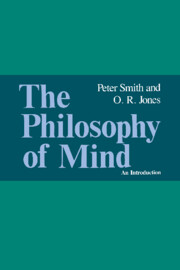Book contents
- Frontmatter
- Contents
- Preface
- Analytical Table of Contents
- PART I Dualism, For and Against
- PART II Towards a Better Theory of the Mind
- PART III Sensation, Thought and Freedom
- XIV Sensations: The Phenomenological Theory
- XV Sensations: Functionalism and Consciousness
- XVI Thinking
- XVII Reasons and Causes
- XVIII Causality and Freedom
- Chronological Table
- Guide to Further Reading
- Bibliography
- Index
XVIII - Causality and Freedom
Published online by Cambridge University Press: 27 January 2010
- Frontmatter
- Contents
- Preface
- Analytical Table of Contents
- PART I Dualism, For and Against
- PART II Towards a Better Theory of the Mind
- PART III Sensation, Thought and Freedom
- XIV Sensations: The Phenomenological Theory
- XV Sensations: Functionalism and Consciousness
- XVI Thinking
- XVII Reasons and Causes
- XVIII Causality and Freedom
- Chronological Table
- Guide to Further Reading
- Bibliography
- Index
Summary
We begin with three reminders. First, it is a deeply entrenched presumption of science that all physical changes are to be explained entirely in terms of physical causes. To use the terminology of IV.6, where we discussed and endorsed this idea, the physical world is ‘causally closed’. Immaterial causes are not to be contemplated: rather, physical changes – with the exception of any entirely uncaused random happenings – are brought about by antecedent physical events, in accordance with the laws of physics.
Second, we humans belong to the physical world, at least in the sense that there is no more to our make-up than ordinary organic stuff. Hence our bodily movements, being just so many more physical events, must themselves have entirely physical causes. For example, a particular arm movement is caused by muscular contractions which are triggered off by events in the peripheral nervous system whose causes can in turn be traced back to highly complex neural events. For further light on the workings of individual neural cells we naturally look to their biochemistry, which is ultimately underpinned by the fundamental laws of molecular physics.
Third, we have claimed it as a virtue of our broadly functionalist account of the mind that it allows us to speak of mental states while still acknowledging that we are (as far as our matter is concerned) purely physical beings. There is, for instance, no incompatibility between saying that a certain arm movement has purely physical causes and saying that it is caused by a desire, because on our view desires are physical states.
- Type
- Chapter
- Information
- The Philosophy of MindAn Introduction, pp. 252 - 268Publisher: Cambridge University PressPrint publication year: 1986



